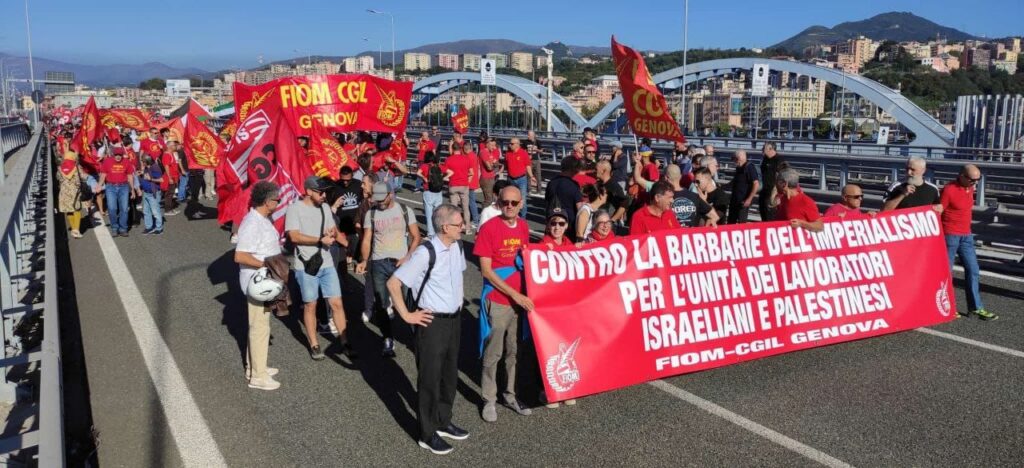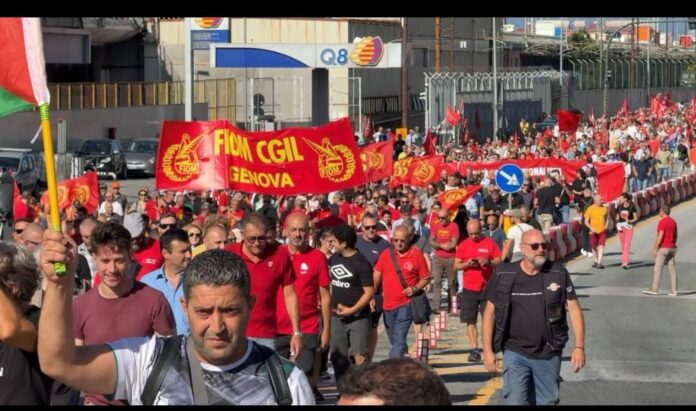Despite the splits within the trade union leaderships, the youth and the working class in Italy have given rise to an unexpected mobilization. Now the point is how to manage the effects of this mobilization and how to provide a political point of reference to those who want to stop the slaughter in Gaza.
In recent days, Italian workers have gone on strike to demand a ceasefire in Gaza and in support of the Global Sumud Flotilla. Unfortunately, the competition between the trade union bureaucracies of the biggest trade union federation, the CGIL, and the rank-and-file unions prevented them from marching together. The USB [Unione Sindacale di Base / Grassroots Trade Union] had called for a general strike for Monday, September 22, weeks ago and did nothing to get the CGIL to join. On the other hand, CGIL decided to call for a general strike three days earlier, on Friday, September 19, but due to Italian rules on industrial action in essential services, some of their members in key sectors (transport, banks, waste collection, health services) were not allowed to participate.
Nevertheless, the Italian working class has shown itself to be ahead of its leaders. On Friday 19/9, tens of thousands of workers marched through the streets of Italy’s major cities, with record numbers turning out in Florence (20,000), Livorno (10,000), and Genoa (5,000), where the CGIL leadership decided to extend the strike from 4 to 8 hours. Genoa is one of the hubs of support for the Flotilla. Music for Peace, an NGO, launched a relief effort for Gaza with the goal of collecting 40 tons of supplies to load onto ships, but after a few days it had to suspend the effort after collecting 200 tons.
In recent years, dockworkers of the USB and Filt CGIL, in joint actions with their French colleagues of the CGT union, blocked several shipments of weapons bound for the Middle East. The last one, on August 7, involved the Saudi ro-ro ship Bahri Yanbu, which was docked in Genoa to load two naval guns manufactured by Oto Melara (a subsidiary of Leonardo Group, the Italian state-owned arms manufacturer and one of the world leaders in Aerospace, Defense & Security). A banner displayed by FIOM CGIL with the slogan “Against the barbarism of imperialism, unity between Israeli and Palestinian workers” sparked both praise and controversy, and gave us in ControCorrente/PuntoCritico the opportunity to intervene in the media and explain why we support an internationalist approach to Middle East issues. This was expressed in a debate with Francesca Albanese, UN Special Rapporteur for the Occupied Territories, recently sanctioned by the US government and now one of the leading figures in the solidarity movement with Palestine [Albanese criticized the FIOM banner in a Facebook post, which was replied by PuntoCritico in this article titled “Why I agree with the FIOM banner”]. A few months ago, after the launch of Rearm Europe, FIOM delegates from Leonardo, one of Italy’s two largest defense groups, issued a statement saying that “we will always respond to the thunder of cannons with internationalism. And we say this to our CGIL union as well.”

On Monday 22/9, the general strike of the USB revealed an unexpected success in terms of both numbers and social composition. Members of the rank-and-file unions, but also of the biggest trade unions including CGIL, filled the squares, recording figures significantly higher than those of Friday 19th (the Rome police commissioner described the march in the capital as “enormous”!). As mentioned, the composition of the demonstration was also significant: in addition to workers and students, there were activists from diverse backgrounds, ordinary people with no political affiliations, representatives of the voluntary sector and the Catholic world, and even some of the most prominent actors and actresses of Italian cinema, who had already mobilized at the recent Venice Film Festival. When some demonstrators occupied Rome’s eastern ring road, stranded motorists responded by honking their horns, applauding, and chanting “Free Palestine.” (VIDEO) A few hours later, even a hundred priests marched “against genocide,” a definition that the new Pope Leone XIV and the Catholic Church have not officially adopted. The day after, during a meeting against the slaughter in Gaza and the EU rearmament plan, even the Nobel Prize–winning physicist Giorgio Parisi spoke from the platform.
Participation in the strike was also high. Beyond the official data, which in Italy is not always reliable, Rome’s central train station remained closed, as did the Rome–Viterbo railway line, and very few buses were in service. In some schools in the province of Rome, there were unusual peaks of 80% participation among teachers — a layer of workers where USB is extremely weak. In Genoa, where according to the press 20,000 people took to the streets, 50% of the bus drivers went on strike.
On Wednesday, after news of the attack on the Flotilla spread, the mobilization restarted and the CGIL released a statement saying: “The CGIL is opposed to all wars, seeks to stop the ongoing genocide perpetrated by the Netanyahu government, and supports the humanitarian mission of the Global Sumud Flotilla. In the event of further attacks, blockades, or seizures of ships or materials, the CGIL is prepared to call a general strike with the necessary urgency” — which would mean violating the current laws which define how to call strikes. We’ll see if, at least this time, the union bureaucracies manage to avoid splitting.
After having reached these impressive results, the issue is how to manage them. The mood of the population, including youth and the working class, is changing under the pressure of war. In some ways, the situation is reminiscent of the Vietnam War protests — with the obvious differences, of course. Having no political point of reference — even on the Flotilla there are different approaches on how to respond to the attacks — workers and young people have wisely decided to use the opportunities provided by the different organizations, as we have seen in the general strikes, to express their indignation with what is happening in the world. For those who believe that internationalism is the best weapon against war, the time to raise their voices has come.




